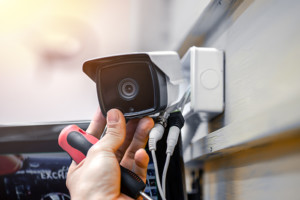 The data is in, and there’s no doubt about it: Security systems help deter crime. A 2009 study by Rutgers University revealed that “neighborhoods in which burglar alarms were densely installed have fewer incidents of residential burglaries than the neighborhoods with fewer burglar alarms.” Newer research seconds that conclusion. In 2016, The University of North Carolina at Charlotte Department of Criminal Justice & Criminology published a study stating that more than eight out of 10 burglars would attempt to determine if a property had a security system prior to attempting to gain entry. If they realized that a property was safeguarded by a security system, about half of thieves would always stop the robbery with another third breaking off at least some of the time.
The data is in, and there’s no doubt about it: Security systems help deter crime. A 2009 study by Rutgers University revealed that “neighborhoods in which burglar alarms were densely installed have fewer incidents of residential burglaries than the neighborhoods with fewer burglar alarms.” Newer research seconds that conclusion. In 2016, The University of North Carolina at Charlotte Department of Criminal Justice & Criminology published a study stating that more than eight out of 10 burglars would attempt to determine if a property had a security system prior to attempting to gain entry. If they realized that a property was safeguarded by a security system, about half of thieves would always stop the robbery with another third breaking off at least some of the time.
Of course, knowing that alarm systems and video surveillance can safeguard your property is only the first step. The next one isn’t quite as easy to take. Clients often ask, “Are wired or wireless security systems better overall? Which type works best for indoor/outdoor security? And which should I select for my specific site?” We’ll provide clear responses for all of these questions (and perhaps some more!) in this post.
How Wired & Wireless Security Systems Work
On a fundamental level, wired and wire-free security systems work the same: Security cameras, motion-detection equipment, window sensors, and other peripherals communicate real-time data to a central control panel. In turn, that control panel relays various alerts to an external monitoring center. That control panel automatically communicates with the external monitoring center when specific information engages certain protocols.
The gestalt for these types of security systems may be the same, but the individual parts are radically different — and you already know why! One uses wires and the other doesn’t. That might not seem like a terribly important distinction, but we’ll see all the ways in which it matters in the following sections.
Wired Security System Pros & Cons
When networked alarms first became popular, wired security systems for homes and businesses were the only option. Not so anymore, but some clients still prefer wired systems for various reasons. Some of the pros of wired security systems include:
- Stability. Unlike high-tech options, hardwired systems remain remarkably stable and continue to relay signals — at least in most circumstances. (See the “Power Loss Risks” point below.)
- Breadth. If you need to have a single system that secures a large building or area, there’s really no replacement for a wired system.
- Interchangeability. Wireless security systems are locked into a particular provider, but wired systems are essentially universal and can flex between different security companies.
That being said, wired security systems aren’t without their drawbacks. Some of those are:
- Higher Installation Costs and More Hassles. Due to the extensive labor required to lay wires (and the expertise necessary to hide them from sight), wired security system installations always cost more and take more time.
- Power Loss Risks. Brownouts or blackouts can leave wired security systems vulnerable unless they’re equipped with backup batteries.
- Vulnerable to Physical Tampering. Savvy thieves can disable such systems if they sever specific wires.
Wireless Security System Pros & Cons
Wireless security systems have exploded in popularity in recent years, and there are several good reasons why. These systems usually come with an increased number of options, and you can easily get wireless security systems for outdoors and wireless security systems with DVR. Other benefits include:
- Economical. Wireless security systems typically cost far less than traditional wired systems.
- Easy Installation. While some wireless systems might require drilling to install, many don’t even require basic home tools to get you up and running.
- Lots of Integration Options. Wireless security systems typically integrate not only with a monitoring company’s database, but also with your smartphone, allowing you to monitor camera feeds, see zone information, and arm and disarm from a distance.
Still, all isn’t always well when it comes to wireless security systems. They have distinct disadvantages, such as:
- Connectivity Issues. If you’ve ever tried to troubleshoot a uncooperative wifi connection, you know the kinds of problems that can occur with wireless security systems. They can go down and stay down for any number of highly technical and difficult-to-resolve reasons.
- Not Always Professionally Monitored. Some of the more inexpensive wireless systems do not include third-party oversight, which greatly limits their usefulness during an actual incident.
- Require More Upkeep. Wireless security systems won’t shut down when the power goes off, but they require batteries to run, and you’ll have to regularly service them.
What about Hybrid Security Systems?
Sometimes clients with an extant wired security system want to enjoy the integration options and flexibility of wireless systems, but they don’t want to replace everything. In these cases, hybrid systems may make sense.
In essence, hybrid security systems add wireless functionality onto an in-place wired system. By installing a wireless sensor, the original system can support additional new wireless equipment. Naturally, owners of hybrid systems will face limitations. Wireless peripherals still count toward the maximum number of system-allowed sensors, for instance. Some of these systems can enjoy cloud-computing functionality, but others may be restricted to local control only.
Reasons to Choose One Over the Other
Your choice of wired or wireless security systems for business will largely depend on the specific needs you have and the limitations you face. Would you prefer to save money by installing it yourself? Do you really want to be able to manage your system with your computer or smartphone? Are you O.K. with regularly checking the batteries that power your system? If so, then a wireless system is your obvious choice.
Conversely, a traditional wired system will make more sense if you:
- Have a warehouse, retail establishment, or some other large space with multiple points of entry
- Need an always-on system that never fails to perform
- Already have a wired system fully or partially installed
Costs, Installation & Maintenance
Common wisdom states that wired systems cost more than wireless, and while that estimation has some merit, it ignores the ways in which individual units can vary. Yes, wired systems almost always cost more to install, but some of the advanced options included with wireless systems may spike your final bill far higher than you imagine. When considering a security system, your first priority should be to find the system that’s best for your specific space.
That’s where we can help. AT&I Systems has more than a quarter century of experience throughout South Florida. We help diverse businesses such as multi-family residential complexes, medical facilities, retailers, financial services providers, and more secure their premises. Contact or call us today at (866) 436-3516 to learn more.

















